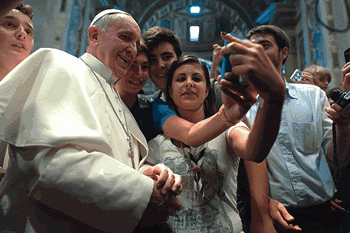Francis speaks on Hope
 Do not worry about tomorrow
Do not worry about tomorrow
Matthew 6:24-34 is a firm reminder to entrust yourself to God — do not forget: entrust yourself to God — who takes care of the living beings in Creation. He provides food for all the animals, looks after the lilies and grass of the field (cf. vv. 26-28); his beneficent and attentive gaze daily watches over our life. Our life passes quickly, tormented by many worries, which risk eliminating peace and balance; but this anguish is often pointless, because it cannot change the course of events.
Jesus persistently exhorts us not to worry about tomorrow (cf. vv. 25, 28, 31), recalling that above everything, there is a loving Father who never forgets his children: entrusting oneself to Him does not magically resolve problems, but allows one to face them with the right attitude, courageously: I am courageous because I entrust myself to my Father who takes care of everything and who loves me very much.
We have a Father who loves us
God is not a distant and anonymous being: he is our refuge, the wellspring of our peace and tranquility. He is the rock of our salvation, to which we can cling with the certainty of not falling; one who clings to God never falls! He is our defence against the evil which is ever lurking. God is a great friend, ally, father to us, but we do not always realise it. We do not realise that we have a friend, an ally, a father who loves us, and we prefer to rely on immediate goods that we can touch, on contingent goods, forgetting, and at times rejecting, the supreme good, which is the paternal love of God. Feeling that he is our Father, in this epoch of orphanhood, is so important! In this orphaned world, feeling that he is Father. We distance ourselves from God’s love when we search incessantly for earthly goods and riches, thus showing an exaggerated liking for these realities.
Seek the Kingdom of God
Jesus tells us that this frenetic search is illusory and a cause of unhappiness. He gives his disciples a fundamental rule of life: ‘seek first and foremost the Kingdom of God’ (cf. v. 33). It is a matter of fulfilling the plan that Jesus proclaimed in the Sermon on the Mount, entrusting oneself to God who does not disappoint. Many friends, or many people whom we believed were friends, have disappointed us. God never disappoints! Dedicating oneself as faithful stewards of the goods that he has given us, even the earthly goods, but without ‘overdoing things’ as if everything, even our salvation, depended only on us. This evangelical attitude requires a clear choice, which today’s reading indicates precisely: ‘You cannot serve God and mammon’ (v. 24). Either the Lord, or fascinating but illusory idols. This choice that we are called to make has an impact on many of our actions, plans and commitments. It means choosing to act very clearly and to continually renew, because the temptation to reduce everything to money, pleasure and power is relentless. There are so many such temptations.
Hope founded on God's faithfulness

L'Osservatore Romano/AP
While honouring these idols leads to tangible, albeit fleeting, results, choosing God and his Kingdom does not always immediately bear fruit. It is a decision one takes in hope and which leaves the complete fulfillment to God. Christian hope is extended to the future fulfillment of God’s promise and does not stop in the face of difficulty, because it is founded on God’s faithfulness, which never fails. He is steadfast; he is a faithful father; he is a faithful friend; he is a faithful ally.
May the Virgin Mary help us to entrust ourselves to the love and the goodness of our heavenly Father, to live in him and with him. This is the prerequisite to overcome life’s vicissitudes and adversities, and also persecution, as the witness of so many of our brothers and sisters shows us.
Source: Angelus address, 26 February 2017,
Libreria Editrice Vaticana
The Bible and the mobile phone
Someone said: what would happen if we treated the Bible as we treat our mobile phone? If we always carried it with us, or at least a small pocket Bible, what would happen? If we went back when we forgot it: you forgot your mobile phone – ‘O, I don’t have it, I’ll go back to find it’; if we opened it several times a day; what would happen if we read God’s messages contained in the Bible, as we read our phone messages?
Source: Angelus Address, Zenit, 6 March 2017
 Entries(RSS)
Entries(RSS)